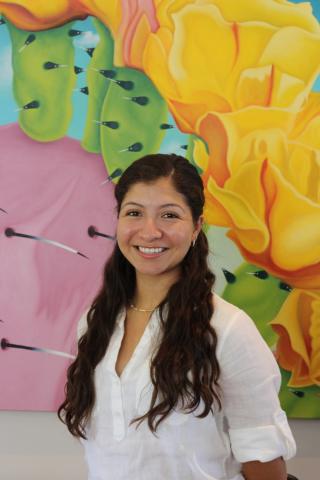Perspective: ‘I learned so much more than I could’ve ever imagined’

Editor's Note: The Carney Institute sponsored Jessica Arzavala to participate in the Leadership Alliance Summer Program.
The Leadership Alliance’s Summer Research Early Identification Program, which is typically held in-person, was offered online this year due to the COVID-19 pandemic. As the program began, I couldn’t help contemplating what it would’ve been like if it were held on the Brown University campus. However, the Leadership Alliance created an experience I will never forget. This program introduced me to a network of inspiring scholars and professionals, while helping me garner a sense for the future.
This summer, I was granted the opportunity to work with Jason Ritt, scientific director of quantitative neuroscience at Brown’s Carney Institute for Brain Science. We have been examining the constraints of complicated dynamical systems in Hodgkin-Huxley form. Hodgkin–Huxley is a mathematical model that describes how action potentials in neurons are initiated and propagated. By creating phase planes and learning about matrices and eigenvectors, I was able to expand my coding skills and learn linear algebra. I found myself dusting off the cobwebs of my high school knowledge of differential equations and making connections with my neuroscience training in college.
Collaborating with Ritt, who is also an assistant professor of neuroscience (research), has exposed me to a part of neuroscience I had never explored. Dynamical systems allow researchers to investigate the functions and characteristics of the nervous system on a computer instead of in a model organism. This field intertwines mathematics, computation and biology to create the perfect concoction for remote research — if you ask me. While I learned a great deal of content, my greatest take-away from working with Ritt is what he taught me about the kind of learner I want to be. From studying tips for beating procrastination to coding etiquette, Ritt pushed me to ask questions and to find comfort in not quite knowing what I’m doing. Through Ritt’s patience and guidance, I have grown as a student and life-long learner.
In addition to what I have learned from the research side of this experience, the Leadership Alliance workshops gave me a clearer idea of what I want my future to look like. Listening to firsthand experiences in panels featuring Brown Ph.D. and M.D./Ph.D. students gave me insight on what to expect in graduate school. As a first-generation college student, I didn’t realize I knew so little about academia. Prior to this program, I believed that deciding what graduate schools to apply to relied solely on the name of the institution. I now know that when I begin to prepare to apply to graduate school, the faculty working on the kind of research that captivates me must be at the forefront of my decision. After participating in the program’s Professional Development Series and virtual recruitment fairs, I’ve gained valuable tools that will help me through the graduate school application process.
One of my favorite aspects of this program was the exposure to novel science. From journal clubs to the “Research in Progress” sessions, I constantly learned about interesting research projects. When my study group hosted a journal club, we read a fascinating paper about social networks. This paper piqued my curiosity in the connection between networks within neurons and the social connections between people. Without these journal clubs, I might have never come across these papers, which gave me new perspectives. This experience has inspired me to start a journal club at my home institution to share innovative science and foster inquisitive discussions.
Moreover, an overarching theme this summer was the broader impacts research has on society. The “Conversations with Doctoral Scholars” series encouraged program participants to consider how race fits into the broader scheme of research and the steps needed to combat racism in the medical field. The people behind the scenes of the Leadership Alliance did a phenomenal job in weaving in current topics and events — from transitioning the program from in-person to online to cultivating a safe space for conversations about the social issues in this country. I applied to this program to expand my network and research experience, but I learned so much more than I could’ve ever imagined.
Jessica Arzavala is a rising junior at Smith College, double majoring in neuroscience and computer science. Outside of the lab, Jessica enjoys hiking and playing volleyball with the club team she co-founded at Smith College.



